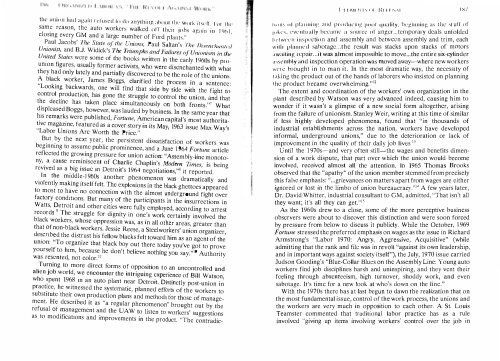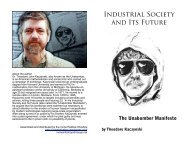CONTENTS - ouroboros ponderosa
CONTENTS - ouroboros ponderosa
CONTENTS - ouroboros ponderosa
Create successful ePaper yourself
Turn your PDF publications into a flip-book with our unique Google optimized e-Paper software.
the union had again refused to dD allylilillg ;Ihoul I l l l· work ilsdt'. hH rill.<br />
sam rcason, the auto workers walked olT their johs ag;lill ill I ()(l l,<br />
closing every GM and a large number of Ford plants "<br />
Paul Jacobs' 'flte State oJ the Union.\ Paul Saltan's 'I he Ih"""c/wnlt'ti<br />
Unionist, and B.J. Widick's The Triumph, and Failures of Unionism in tl,,'<br />
United .States were some of the books written in the early 1960s by proumon<br />
figures, usually former activists, who were disenchanted with what<br />
they had only lately and partially discovered to be the role of the unions.<br />
A black worker, James Boggs, clarified the process in a sentence'<br />
"Looking backwards, one will lind that side by side with the fight t,;<br />
control productIOn, has gone the struggle to control the union and that<br />
the declinc has taken place simultancously on both front;.'" What<br />
displcased Boggs, however, was lauded by business. In the same year that<br />
hIS remarks were published, Fortune, American capital's most authorita<br />
:,ivc magazine, featured as a cover story in its May, 1963 issue Max Way's<br />
Labor Umons Are Worth the Price,"<br />
But by the next year, the persistent dissatisfaction of workers was<br />
beginning to aSSume public prominence, and a June 1964 Fortune article<br />
reflected the growing pressure for union action: "Assembly-line monoto<br />
reVIved as a bIg Issue In Detroit's 1964 negotiations,'" it reported .<br />
ny, . a cause reminiscent of Charlie Chaplin's Modem 1Imes, is being<br />
. In the middle-1960s another phenomenon was dramatically and<br />
VIolently makIng Itselt felt. The explosions in the black ghettoes appeared<br />
to most to have no connection with the almost underground tight over<br />
factory cond,t,ons. But many of the participants in the insurrections in<br />
Watts, Detroit and other cities were fully employed, according to arrest<br />
records .' The struggle for dignity in one's work certainly involved the<br />
black workers, whose oppression was, as in all other areas, greater than<br />
that at non-black workers. Jessie Reese, a Steelworkers' union organizer,<br />
desCfJbd the dIstrust his fellow blacks felt toward him as an agent of the<br />
unlon: To orgamze that black boy out there today you've got to prove<br />
yourselt to hIm, because he don't believe nothing you say."lO Authority<br />
was resented, not color l'<br />
Turning to more direct forms of opposition to an uncontrolled and<br />
alien job world, we encounter the intriguing experience of Bill Watson,<br />
who spent 1968 In an auto plant near Detroit. Distinctly post-union in<br />
praelIee, he wItnessed the systematic, planned efforts of the workers to<br />
substitute their Own production plans and methods tor those of manage<br />
ment. He described it as "a regular phenomenon" brought out by the<br />
refusal at anagement and the UA W to listen to workers' suggestions<br />
as to modIfIcatIons and improvements in the product. "The contradic-<br />
1·1 1-t\lH I, !ll- 1{1' 1 ' 11,'\1<br />
ILIlilS (1\ p l a l i llil ll '. :111d produci1lg Illlur quality, heginning as the Sl,ull llf<br />
II 'J,.{·S, (·v{" lItually hecamc- a source of angr.,.teJllPorary deals lntoldcd<br />
I'clwnoll i llspection and assemhly and between assemhly and tnm, each<br />
willi planned sahotage ... the result was stacks upon stacks of motors<br />
"waiting rcpair. . .it was almost impossible to move ... the entIre SIX-cylInder<br />
""cmoly and inspection operation was moved away-where new workers<br />
w\'le hrought in to man it. In the most dramatic way, the necessIty . of<br />
laking the product out of the hands of laborers who insisted on planmng<br />
. ,,1 b h I 2<br />
1 he product ecame overw C ffimg. . . .<br />
The extent and coordination of the workers' own orgamzatlOn In the<br />
plant described by Watson was very advanced indeed, causing him to<br />
wonder if it wasn't a glimpse of a new social form altogether, ansIng .<br />
from the failure of unionism. Stanley Weir, writing at this time of similar<br />
if less highly developed phenomena, found that "in thousands of<br />
industrial establishments across the nation, workers have developed<br />
informal, underground unions," due to the deterioration or lack of<br />
improvement in the quality of their daily job lives ll .. ' _<br />
Until the 1970s-and very often still-the wages and bcnehts dImen<br />
sion of a work dispute, that part over which the union would become<br />
involved received almost all the attention. In 1965 Thoma, Brooks<br />
observed that the "apathy" of the union member stemmed from precisely<br />
this false emphasis: " ... grievanees on matters apart from wages are either<br />
ignored or lost in the limbo of union bureaucracy."" A few years later,<br />
Dr. David Whitter, industrial consultant to G M, admitted, "That isn't all<br />
they want; it's all they can get."I'<br />
As the 1960s drew to a close, some of the more perceptIve , busmess .<br />
observers were about to discover this distinction and were soon forced<br />
by pressure from below to discuss it publicly. While the October , 1969<br />
Fortune stressed the preferred emphasis on wages as the Issue m RIchard<br />
Armstrong's "Labor 1970: Angry, AggreSSive, Acquisitive" (while<br />
admitting that tbe rank and fik was in revolt "against its own leadershIp,<br />
and in important ways against society itself"), the July, 1970 issue carried<br />
Judson Gooding's "Blue-Collar Blu es on the Assembly Line: Young auto<br />
workers find job disciplines harsh and uninspiring, and they vent theIr<br />
feeling through absenteeism, high turnover, shoddy work, and even<br />
sabotage. It's time for a new took at who's down on the line."<br />
With the 1970s there has at last begun to dawn the realization that on<br />
the most fundamental issue, control of the work process, the unions and<br />
the workers are very much in opposition to each other. A St. Louis<br />
Teamster commented that traditional labor practice has as a rule<br />
involved "giving up items involving workers' control over the job in<br />
I x I






